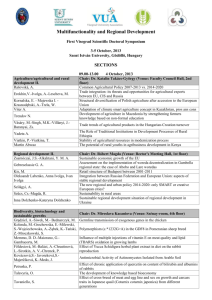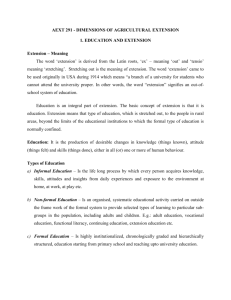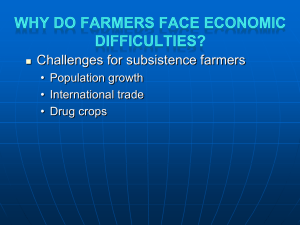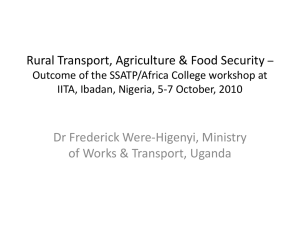ready-to
advertisement
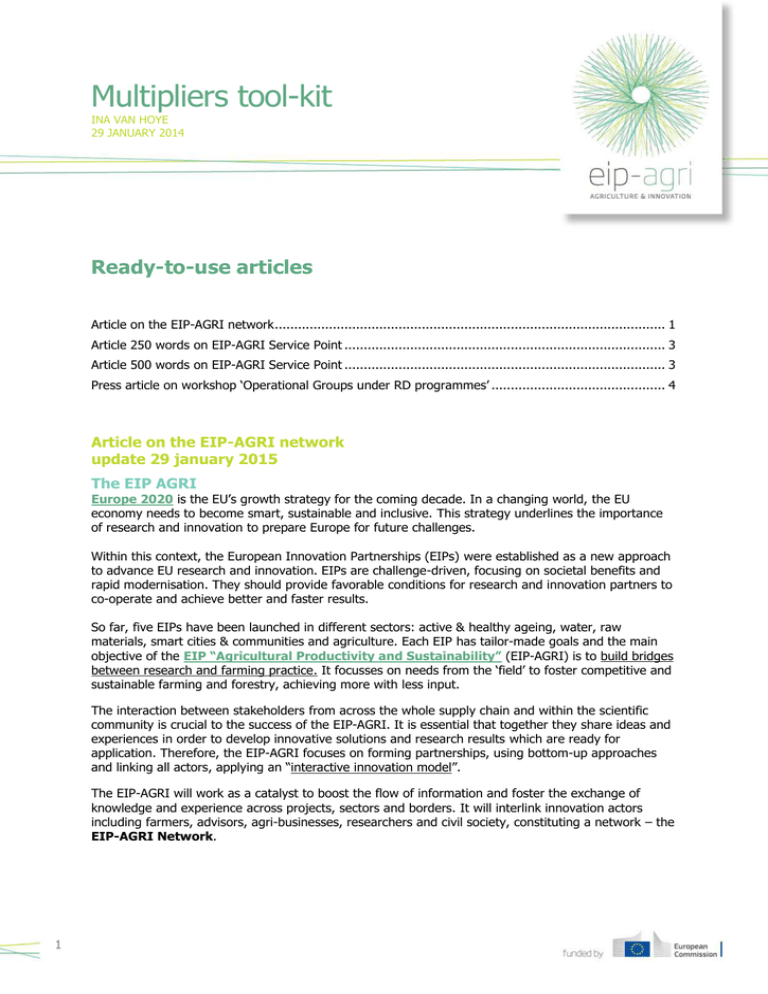
Multipliers tool-kit INA VAN HOYE 29 JANUARY 2014 Ready-to-use articles Article on the EIP-AGRI network ..................................................................................................... 1 Article 250 words on EIP-AGRI Service Point ................................................................................... 3 Article 500 words on EIP-AGRI Service Point ................................................................................... 3 Press article on workshop ‘Operational Groups under RD programmes’ ............................................. 4 Article on the EIP-AGRI network update 29 january 2015 The EIP AGRI Europe 2020 is the EU’s growth strategy for the coming decade. In a changing world, the EU economy needs to become smart, sustainable and inclusive. This strategy underlines the importance of research and innovation to prepare Europe for future challenges. Within this context, the European Innovation Partnerships (EIPs) were established as a new approach to advance EU research and innovation. EIPs are challenge-driven, focusing on societal benefits and rapid modernisation. They should provide favorable conditions for research and innovation partners to co-operate and achieve better and faster results. So far, five EIPs have been launched in different sectors: active & healthy ageing, water, raw materials, smart cities & communities and agriculture. Each EIP has tailor-made goals and the main objective of the EIP “Agricultural Productivity and Sustainability” (EIP-AGRI) is to build bridges between research and farming practice. It focusses on needs from the ‘field’ to foster competitive and sustainable farming and forestry, achieving more with less input. The interaction between stakeholders from across the whole supply chain and within the scientific community is crucial to the success of the EIP-AGRI. It is essential that together they share ideas and experiences in order to develop innovative solutions and research results which are ready for application. Therefore, the EIP-AGRI focuses on forming partnerships, using bottom-up approaches and linking all actors, applying an “interactive innovation model”. The EIP-AGRI will work as a catalyst to boost the flow of information and foster the exchange of knowledge and experience across projects, sectors and borders. It will interlink innovation actors including farmers, advisors, agri-businesses, researchers and civil society, constituting a network – the EIP-AGRI Network. 1 READY-TO-USE ARTICLES UPDATE 29 JANUARY 2015 A Service Point for the EIP-AGRI The EIP-AGRI Service Point acts as a mediator within the EIP-AGRI Network, enhancing communication and cooperation between innovation actors and it organises its work within three areas of activity: Sharing knowledge The EIP-AGRI Service Point offers the actors an online platform where knowledge can be shared at the Meeting Point and needs from practice for further research can be collected. Moreover, it collects and shares information on innovation-related policy measures and initiatives, relevant research activities and results, funding opportunities and lessons learnt in practice-oriented projects. The EIP-AGRI website aims to become the ‘one-stop-shop’ for agricultural innovation in the EU with upcoming events, publications, calls for Focus Groups or general information on EIP-AGRI. The EIP-AGRI Service Point interacts with different groups, players, platforms and networks using multiple communication channels such as seminars, workshops, publications, websites and social media. Tackling challenges The EIP-AGRI is a vehicle to put farmers' R&D needs on research agendas. The EIP-AGRI Service Point collects research needs from practice, facilitating knowledge sharing and searching for innovative solutions to address key challenges. One of the main tools to kick start the sharing of innovative solutions within specific fields is the Focus groups: groups of 20 researchers, farmers, advisors and other stakeholders work together to share knowledge and practical experience to boost innovation within a very specific field. An example is the focus group on soil organic matter content in Mediterranean regions where participants worked together between 2014 and 2015 to find out how the soil organic matter content in these regions can be improved in a cost-effective way and what new solutions for securing soil functionality and soil fertility can be proposed in this regard. Connecting people Innovation starts with bringing people together to generate inspiration. The EIP-AGRI aims to link innovative projects carried out by Operational Groups of farmers, advisors, researchers and others solving practical problems or testing innovative ideas with national Rural Development programme funding, thematic networks , partners involved in multi-actor projects funded by the EU Horizon 2020 Research programme, and other groups working on innovation. To trigger this process, the EIP-AGRI Service Point organises face-to-face meetings, provides web-based exchange and information, social media and other means of communication to bring actors together. For more information visit the EIP-AGRI website www.eip-agri.eu and subscribe to the EIP-AGRI monthly newsletter, follow the Service Point on Twitter or join the LinkedIn Group. By registering to the EIP-AGRI website you become a member of the EIP-AGRI Network: ready to share and search. You can download general brochures on various topics such as Horizon 2020, Innovation Support Services, Operational Groups under Rural Development, the EIP-AGRI Service Point and the EIP-AGRI network. Topical brochures on Organic Farming, Reducing antibiotics in pig farming, Forestry,… are available as well. 2 READY-TO-USE ARTICLES UPDATE 29 JANUARY 2015 Article 250 words on EIP-AGRI Service Point update 29 January 2015 Innovating agriculture through cross-sector partnerships The EIP-AGRI Service Point builds bridges to connect science and practice To secure a sustainable and productive future, EU agriculture needs innovation. Early 2013, the European Commission set up the EIP-AGRI Service Point to help address this challenge by connecting people and facilitating innovation and knowledge-exchange in the European Innovation Partnership network. Pacôme Elouna Eyenga, team leader EIP-AGRI Service Point explains: “By forming partnerships, using bottom-up approaches and linking all actors such as farmers, researchers, advisors, businesses, environmental groups, consumer interest groups and other NGOs, a strong EIP-AGRI network can help to reach our goal”. The EIP-AGRI website aims to become the ‘one-stop-shop’ for agricultural innovation in the EU with questions on funding opportunities, upcoming events, publications, calls for Focus Groups or general information on EIP-AGRI and a modular interactive online platform. For more information please visit the EIP-AGRI website www.eip-agri.eu and subscribe to the EIPAGRI monthly newsletter, follow the Service Point on Twitter or join the LinkedIn Group . Join the EIP-AGRI Network and register to the website. Article 500 words on EIP-AGRI Service Point update 29 January 2015 Catalysing innovation in agriculture through cross-sector partnerships The EIP-AGRI Service Point builds bridges to connect science and practice To secure a sustainable and productive future, agriculture in the EU needs innovation. In early 2013, the European Commission set up the EIP-AGRI Service Point to help address this challenge by connecting people and facilitating innovation and knowledge-exchange through the European Innovation Partnership network. The idea is to enhance communication and cooperation between all actors: farmers, researchers, advisors, businesses, environmental groups, consumer interest groups and other NGOs. Exchanging experiences and sharing information is key. A future EIP-AGRI networking success might be that a Greek manufacturer of agricultural appliances adapts a machine in cooperation with a Belgian farmer to enhance productivity. The goal is to achieve quick exchanges of information between networks of all types of agricultural stakeholders. Juan Castro Insua, Director of CIAM, a public research centre in Galicia, Spain, is an agronomist researcher: “Our centre strives to value manure as a resource and not as waste. We teach that it has to be handled as fertiliser, a way to help to save money, without the big issue of nitrate-contaminated water. If we can tell other European farmers and researchers to help tackle the same kind of problem by simply using the EIP-AGRI Service Point services, it would be great progress”. The EIP-AGRI Service Point is creating an online platform that can be used to share and exchange information with others. Information on EIP operational groups, research projects, innovation actions and initiatives, research needs from practice and online sources of information will all be available via this website. Pacôme Elouna Eyenga, team leader for the EIP-AGRI Service Point states “Many people have interesting ideas for innovation but often find it challenging to find the right partners to set up 3 READY-TO-USE ARTICLES UPDATE 29 JANUARY 2015 their concrete project. The EIP-AGRI website will help in doing just that. Of course, we need all of the people involved to help to build these networks and platforms: it will only be as strong as the total sum of its participants”. The EIP-AGRI website aims to become the ‘one-stop-shop’ for agricultural innovation in the EU with questions on funding opportunities, upcoming events, publications, calls for EIP-AGRI Focus Groups or general information on EIP-AGRI. Besides the online platform, Focus Groups gather, summarise and disseminate knowledge on very specific agricultural topics (for example reducing antibiotics use on pig farms, making protein crops more competitive in Europe and improving yields in organic arable farming). Focus Groups consist of 20 experts including farmers, advisors, researchers, agri-businesses with different types of background and experience. Go to the EIP-AGRI website www.eip-agri.eu and subscribe to the EIP-AGRI monthly newsletter, follow the Service Point on Twitter or join the LinkedIn Group. You can also download brochures on various topics such as Horizon 2020, Innovation Support Services, Operational Groups under Rural Development, the EIP-AGRI Service Point and the EIP-AGRI network. The EIP-AGRI Service Point also disseminates information and brings different types of actors together through conferences, seminars or workshops. More information can be found on the EIP-AGRI website in the section dedicated to EIP-AGRI events. Press article on workshop ‘Operational Groups under RD programmes’ distributed 27 February 2014 Workshop to promote innovation in European agriculture Establishing Operational Groups under Rural Development Programmes The Portuguese National Rural Network (NRN) and the National Authority for the European Agricultural Fund for Rural Development (EAFRD) hosted, in collaboration with the European Commission, a workshop on “Establishing Operational Groups under Rural Development Programmes” in Lisbon on 27 February 2014. Organisations linked to agricultural innovation from Portugal, Spain, Greece and Malta participated. The workshop gave stakeholders practical information on how to set up “Operational Groups” which will be working on practical innovation projects with support from Rural Development funds. The European Innovation Partnership on “Agricultural Productivity and Sustainability” (EIP-AGRI) aims to develop competitive and sustainable farming and forestry throughout the EU. One of the most important approaches used by EIP-AGRI is to encourage the formation of Operational Groups which involve different types of actors such as farmers, advisors, researchers (amongst others), and target practical innovation. “Innovation is the key to a modern agriculture within the EU. To create this innovation, we need practice-oriented solutions to existing problems or opportunities. We want to inform organisations, farmers, researchers, businesses and other stakeholders about what they need to do to launch such an innovation project with support from our Rural Development policy” explains Rob Peters from the European Commission. “At the workshop, by providing specific examples of what an Operational Group could look like, we encouraged organisations to find the right partners to pursue the innovation they have in mind” says Rob Peters. The workshop also focused on identifying practical next steps for organisations that can actively support the implementation of the EIP-AGRI. These organisations or “EIP multipliers” can facilitate the exchange of knowledge and experience between other potential “multipliers” mainly at 4 READY-TO-USE ARTICLES UPDATE 29 JANUARY 2015 national/regional and local level, but also at international level. Furthermore, they can promote and help the setting-up of Operational Groups by spreading the word, providing information and linking potential partners. Custódia Correia from the Portuguese NRN confirms: “We are indeed promoting innovation in agriculture and setting up Operational Groups is an important tool. It is amazing what cooperation and sharing of knowledge can achieve: for example, in Montejunto which is known for its fruit production, farmers had problems with a high percentage of damaged fruit. Unfortunately, they were unable to identify the critical points of damage in different fruit throughout the total production process. A local network of 32 fruit producers, named Frutus (Central Fruit Montejunto) invited the Centre for Rapid and Sustainable Product Development Polytechnic Institute of Leiria (IPL-CDRsp) and the National Operating Technological and Horticultural Centre (COTHN) to find a solution to this problem. They set up a group to work together to identify and reduce the damage caused by the mishandling of the fruit. Together they were able to design and manufacture a new electronic fruit (electronic product), which made it possible to measure the damage caused by impact and compression. They found out what the critical points in the processing line were and so by adjusting the processing machines, they could minimise the damage to the fruit. Because the fruit was less damaged, it was higher in quality ranking and was worth more on the market. The electronic fruit is easily adaptable to the measurement of damage in other fruit and vegetables.” This workshop was the first of five to be organised in the EU. Find out the presentations, reports and background information on the website: Portugal Slovenia Estonia Czech Republic France 5


